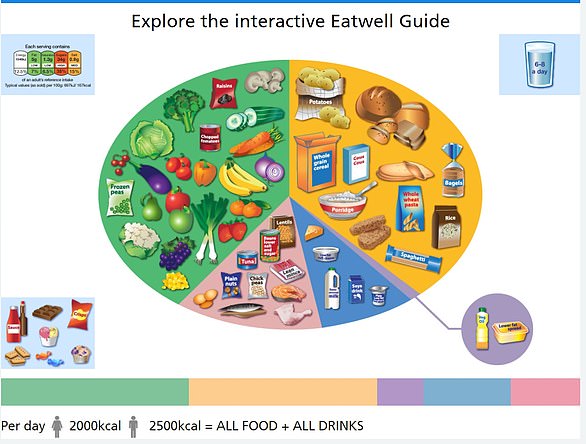A quarter of Brits who eat healthy meals are at risk of heart disease and stroke from snacking on biscuits, cake and chips, research shows
Bedtime cookies may no longer be on the menu.
A study shows that a quarter of people negate the benefits of healthy meals by snacking unhealthy.
Researchers from London, who tracked the eating habits of more than 850 people, found that one in four reported eating unhealthy snacks – such as chocolate, chips and cakes – in addition to ‘healthy meals’.
The results suggested that this group ‘negated the benefits’ of eating a nutritious breakfast, lunch and dinner, as eating junk food snacks was linked to having a higher BMI and blood sugar levels, increasing the risk of stroke, heart disease and obesity increased.
However, analysis showed that snacks in themselves are not unhealthy, as long as people choose healthy treats such as fruit, nuts and seeds.
Researchers from London, who monitored the eating habits of more than 850 people, found that one in four reported eating unhealthy snacks – such as chocolate, chips and cakes – in addition to ‘healthy meals’. The results suggested that this group ‘negated the benefits’ of eating a nutritious breakfast, lunch and dinner, as eating junk food snacks was linked to having a higher BMI and blood sugar levels, increasing the risk of stroke, heart disease and obesity increased.
The scientists monitored the snacking habits of 854 people from the ZOE PREDICT study A group of in-depth nutritional studies that aim to reveal how and why people react differently to the same foods.
Participants consumed “standardized test meals” for nine to 11 days and recorded the amount and types of snacks consumed using an online food diary.
About 95 percent of the cohort admitted to snacking, while the average daily intake was 2.28 snacks per day.
About 29 percent of people ate more than two, researchers said.
But in the European Journal of Nutrition, scientists from Kings College London write that 26 percent of participants reported eating healthy meals, but opting for ‘poor quality snacks’, which left them ‘hungry’.
This group had ‘worse health characteristics’.
However, snacking frequency had no influence on blood fats and blood pressure.
Dr. Sarah Berry from King’s College London and Chief Scientist at ZOE said: ‘When you consider that 95 per cent of us snack, and almost a quarter of our calories come from snacks, we are replacing unhealthy snacks such as biscuits, crisps and cakes with healthy snacks such as fruit and nuts is a very simple way to improve your health.’
The most popular snacks consumed were biscuits, fruit, nuts and seeds, cheese and butter, cakes and pies and muesli or breakfast cereals, scientists said.
High blood sugar and fat levels can lead to diabetes and heart disease, studies show.
People with diabetes are also more likely to have other conditions that increase the risk of heart disease, such as high blood pressure.
The researchers also found that those who ate ‘high-quality snacks’ – such as nuts, fresh fruit and granola bars – had ‘better metabolic health’ and were not as hungry.
Ultra-processed foods such as cakes, chips and brownies generally have higher sugar, salt and saturated fat content compared to less processed foods.
The term refers to foods that contain ingredients that someone would not add when cooking at home, such as chemicals, colorings and preservatives.
These include prepared foods, ice cream, sausages, Southern fried chicken, cereal and ketchup.
They differ from processed foods, which are processed to extend their shelf life or improve their taste, such as cured meats and cheese.
But researchers also found that the timing of snacks was also crucial for health, with eating later in the evening carrying ‘significantly more negative health consequences’.
People who ate the most snacks in the evening after 9 p.m. saw bigger spikes in their blood sugar levels compared to those who snacked earlier in the day, they said.
Those who snacked later also had higher fat concentrations in their blood compared to those who snacked earlier.
At that time, snackers usually ate energy-dense foods high in fat and sugar.
Dr. Kate Bermingham from King’s College London and senior scientist at ZOE said: ‘This study adds to the existing literature that food quality is the driving factor in positive health outcomes from food.
‘Making sure we eat a balanced diet of fruits, vegetables, proteins and legumes is the best way to improve your health.’

